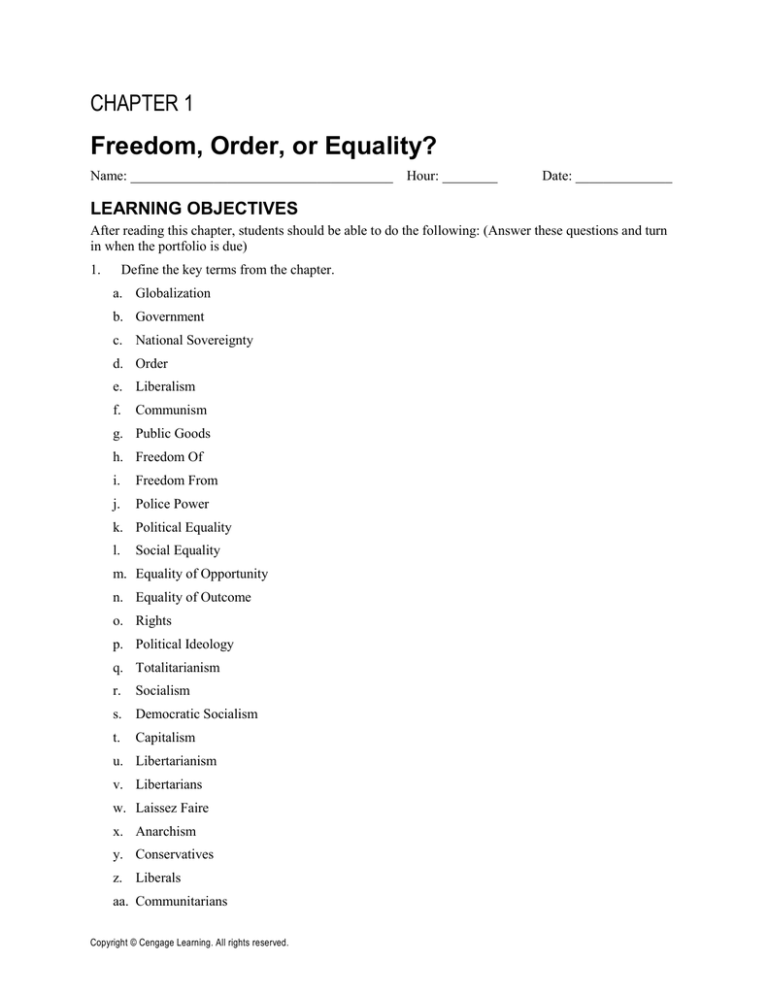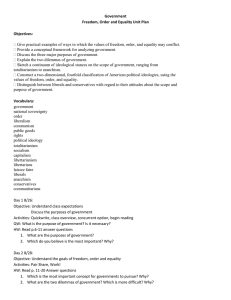
CHAPTER 1
Freedom, Order, or Equality?
Name: ______________________________________ Hour: ________
Date: ______________
LEARNING OBJECTIVES
After reading this chapter, students should be able to do the following: (Answer these questions and turn
in when the portfolio is due)
1.
Define the key terms from the chapter.
a. Globalization
b. Government
c. National Sovereignty
d. Order
e. Liberalism
f.
Communism
g. Public Goods
h. Freedom Of
i.
Freedom From
j.
Police Power
k. Political Equality
l.
Social Equality
m. Equality of Opportunity
n. Equality of Outcome
o. Rights
p. Political Ideology
q. Totalitarianism
r.
Socialism
s. Democratic Socialism
t.
Capitalism
u. Libertarianism
v. Libertarians
w. Laissez Faire
x. Anarchism
y. Conservatives
z. Liberals
aa. Communitarians
Copyright © Cengage Learning. All rights reserved.
Chapter 1: Freedom, Order, or Equality?
2.
Summarize the subprime mortgage crisis and its global implications.
3.
What is the traditional definition of government and discuss why globalization makes that definition
less compelling than it once was.
4.
Identify reasons why the United States opposes an international court.
5.
Discuss the three major purposes of government and explain their differences.
6.
Discuss the divergent views of Thomas Hobbes, John Locke, and Karl Marx toward the purposes of
government.
7.
Identify the three concepts that describe the values pursued by government.
8.
Explain the differences between the concepts of majoritarian and pluralist models of democratic
government.
9.
Define “social order,” providing examples of its application and indicating why people are hesitant
to accept this definition of order.
10. Compare and contrast the terms “freedom of” and “freedom from,” providing an example of each.
11. Distinguish between political equality and social equality, explaining the two routes to achieve
social equality.
12. Explain the two dilemmas of government.
13. Construct a two-dimensional, fourfold classification of American political ideologies, using the
values of freedom, order, and equality.
14. Distinguish between liberal and conservative attitudes about the scope and purpose of government.
15. Explain both the libertarian and communitarian attitudes about the scope and purpose of
government.
CRITICAL THINKING QUESTION FOR CLASS DISCUSSION
16. Considering what values are most important to you, is freedom more important than order? If
there is an issue, such as airport security, how much freedom is the right amount an individual should
have to surrender for his/her safety?
------------------------------------------------------------------------------------------------------------------------------(The following information is for your information only. You do not need to answer anything
below. Use it to help you throughout the chapter).
CHAPTER SYNOPSIS
The era of Globalization has deeply impacted governance in the United States. In so doing, i t has deeply
affected the relationship between an individual and his/her sovereign government. Thus, one of the
principal challenges of modern democracy lays in having to make difficult choices. These choices can
bring one's core values into discord. This chapter outlines a normative framework for analyzing the policy
choices that develop through the pursuit of the purposes of government.
One choice those in government must make is how much national sovereignty should be yielded to
international law. Since Globalization tends to erode national sovereignty, choices must be made as to
how much authority should be given to international laws and institutions. Therefore, one must
understand the impact of politics abroad on the United States and, conversely, the role of politics in the
United States on governments abroad.
Copyright © Cengage Learning. All rights reserved.
Chapter 1: Freedom, Order, or Equality?
While many individuals see a variety of purposes for government, we identify three major purposes of
government: maintaining order, providing public goods, and promoting equality. The pursuit of these
objectives inevitably creates two tensions democratic governments must negotiate. The first is the classic
conflict between freedom and order. The second is the modern conflict between freedom and equality.
Seemingly every dilemma in American political life can be observed through the prism of this conflict.
Many people use political ideologies to help create a framework to resolve the conflicts that arise in such
conflicts. Ideologies define the scope and purpose of government. On the polar end of the political
continuum is totalitarianism, which stands opposite of anarchism. Totalitarianism supports government
intervention in every aspect of government, whereby anarchism rejects government entirely.
Libertarianism and communitarians serve as more moderate variations of these two extremes. Libertarians
prefer a small government in regards to both social and economic policy. On the other hand,
communitarians prefer a large role for government in both the economic and social spheres.
In American politics, we use the terms liberal and conservative to denote a more narrow range toward the
center of the political continuum. Conservatives typically want less government in the economic sphere
and more government involvement in the social sphere. Conversely, liberals tend to desire more
government involvement in the economic sphere and less in the social sphere. In other words, both
ideologies desire a combination of small and large government, with a shifting emphasis as to where that
involvement should be. Alternately, libertarians and communitarians are consistent in that one wants a
small government in nearly all situations, and the other wants a large in nearly every situation.
Libertarians and liberals are in agreement in regards to social policy, and libertarians and conservatives
tend to agree on economic matters. Communitarians tend to agree with liberals regarding a large role for
government in economic matters, and they tend to agree with conservatives regarding a high level of
government involvement in social policy.
CHAPTER OUTLINE
I.
The Globalization of American Government
II.
The Purposes of Government
A. Maintaining Order
B. Providing Public Goods
C. Promoting Equality
III.
A Conceptual Framework for Analyzing Government
IV.
The Concepts of Freedom, Order, and Equality
A. Freedom
1. Freedom of
2. Freedom from
3. The four freedoms
B. Order
1. Police powers
C. Equality
1. Political Equality
2. Social Equality
3. Equality of opportunity
4. Equality of outcome
V.
Two Dilemmas of Government
A. The original dilemma
1. Freedom versus order
B. The modern dilemma
1. Freedom versus equality
Copyright © Cengage Learning. All rights reserved.
Chapter 1: Freedom, Order, or Equality?
VI.
Ideology and Scope of Government
A. Political Ideology
1. Totalitarianism
2. Socialism
3. Capitalism
4. Libertarianism
a. Laissez-faire
5. Anarchism
6. Liberals
7. Conservatives
INTERNET RESOURCES
The Communitarian Network www.gwu.edu/~ccps/
Learn more about how this nonpartisan association is working to strengthen the moral and political
environment in the United States.
Ideological Debates www.politics1.com/
Politics1 compares and contrasts ideologies from every part of the continuum with links to news and opinion
on election issues.
Balanced Politics www.balancedpolitics.org/ideology.htm
Definitions of political ideologies
Political Compass www.politicalcompass.org/
An ideology questionnaire that is a good source for determining your ideology
World’s Smallest Political Quiz www.theadvocates.org/quiz.html
An online quiz that may assist you in determining your ideology
Select Smart www.selectsmart.com/FREE/select.php?client=athena
Another online quiz that may assist you in determining your ideology
The National Political Index www.politicalindex.com
A one-stop shop for substantive political information and debate
The Global Policy Forum www.globalpolicy.org
A nonprofit organization dedicated to monitoring United Nations policy and promoting accountability for
global decisions
FURTHER READINGS
Arendt, Hannah. The Origins of Totalitarianism. New ed. New York, 1973.
Friedman, Thomas. The World Is Flat: A Brief History of The Twenty-first Century (2005; expanded edition 2006;
revised edition 2007)
Hobbes, Thomas. Leviathan. Edited by J.C.A. Gaskin. Oxford: Oxford University Press, 1996
John Locke, The Two Treatises of Civil Government (Hollis ed.), 1689
Copyright © Cengage Learning. All rights reserved.





